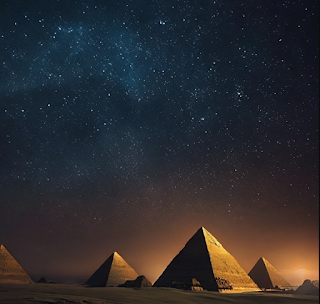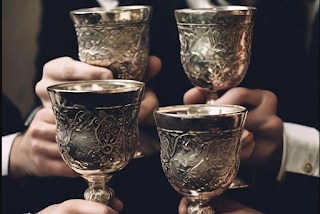Search Blog
Hit enter to search or ESC to close
Trending Now
Parshas Vaera - Bo - Were the Jews Affected by the Plagues?
- Get link
- X
- Other Apps
Parshas Shemos/Vaera - The Birth of a New Religion and the Age of Miracles
- Get link
- X
- Other Apps
- Get link
- X
- Other Apps
Pesach revolves around the number four. From the four expressions of liberation (arba leshonos shel geulah), to the four cups of wine, the four questions and the four sons, we celebrate surrounded by fours.
But is there a connection between the two key educational dialogue elements of the seder: the four sons and the four questions?
The four sons, righteous, wicked, simple, and the one who cannot even ask, serve as a kind of mission statement for the haggadah's approach to a multi-dimensional seder experience that reaches both the ignorant and the wise, who have their own questions.
The four questions or the Ma Nishtana, are the first questions taught to a child, the she'eino yodea lishol or the one who cannot yet ask on his own, to ask about the differences between the night of Pesach and the ordinary night.
It is possible to link the four sons to the four questions and in that way make sense of some of the answers to the four sons which can appear puzzling or abrasive.
Take the wise son who inquires, "What are the testimonials, statutes and laws Hashem our G-d commanded you?" The oddly narrow response involves the ban on eating anything after the Pesach offering, a practice that is commemorated during the post-Temple exile seder with the final eating of the afikoman or the leftover matza.But let's overlap that with the first question of the Ma Nishtana. "Why is this night of Pesach different from all other nights? On all other nights, we eat chametz or matza, but on this night of pesach, only matza."
Let's get at the essence of the first question which is not at all trivial, but gets at the heart of Judaism.
How can it be that chametz, ordinary bread for example, is permitted and even celebrated the rest of the year, but is the worst possible offense on Pesach?
The answer, on one level, is that nothing may be eaten after the Pesach offering. Time matters in Judaism. So do sequence and context. Judaism is not a series of unrelated commandments or behaviors, but a sequence and an order or seder. Matza may be permitted and commanded before, but not after the Pesach sacrifice, and chametz may be permitted all year round, but not on Pesach.
The essence of the commandment of matza and the ban on chametz is chronological. It forces us into another mode, examining the contrasts between slavery and freedom, and the speed of liberation.
But matza is also a lechem oni, a poor man's bread. It is a reminder that freedom comes with sacrifice, not just the Pesach sacrifice, but personal sacrifice. The exodus forces the Jews to often make do with less, matza instead of bread, limited water, manna instead of the fish and leeks they will later lust for in the desert.
Restricting ourselves to matza, not bread, cakes, or challah, forces us to remember that reality because it is a fundamental part of our religious life. To serve G-d, we have to give up things.
On a deeper level, the first Ma Nishtana question asks, why can't we just enjoy the things we eat, instead of limiting ourselves to matza? Why does life as a Jew sometimes have to be hard?
And the response to the first son is that the sequence matters because we are still working our way to the Pesach sacrifice, the final redemption. And nothing can come after that ultimate triumph. But until then we are limited and we face limits, the work we do and the lives we live can be hard and difficult.
But the conclusion will be glorious.
The second Ma Nishtana question asks why on all nights we eat all sorts of greens, but on Pesach, only marror, the bitter horseradish root. Likewise the wicked son demands, "Mah ha'avdoah hazot lachem" or "What is this service to you." The word avodah can mean service, but also labor and drudgery.
Why, he asks, do you adopt this miserable burden, this harsh life symbolized by eating marror. A life that he implicitly rejects.
The response, "You should blunt his teeth by saying to him: "'It is for the sake of this that Hashem did for me when I left Egypt. For me and not for him. If he was there he would not have been redeemed'" appears abrasive, but also lays out a certain basic communal truth.
Jewish communal suffering led to the redemption. Those Jews who opt out of the community and its challenges also opt out of the redemption.
The wicked son wants an easy life, but it means that he will not share in the triumphs of his former people.
The work of serving G-d that we do is really liberation. While the wicked son's escape appears liberating, but is actually an enslavement. The Jews can become free while being slaves, while the wicked sons think that they are free when they are actually slaves.
Liberation of the spirit consists of that understanding. As Rabbi Moshe Feinstein said to Russian Jews in the Soviet Union, the government does not have the power to exile our souls. Exile is an internal state.
Finally the latter two questions and the latter two sons, simple and ignorant, emphasize the importance of accessibility.
The third Ma Nishtana question inquires about the two dippings. Repetition is the best way to reach the simple child who learns by hearing the same thing time and again.
But it also addresses, in the larger geulah-listic sense, the implicit question of why one exile is followed by another, why there is a repetition of exiles, enslavements, and sufferings.
The answer is that G-d took us out of Egypt with a mighty hand. Repetition is force, but also our redemption was not a natural result of our virtue, but Divine intervention. The Jews are not yet where we need to be and repetition is a required consequence of that reality. More growth is needed both for the simple son and for the Jewish people.
Finally, the son who does not know how to ask is paired with the question of why we recline at the seder.
Reclining is seen as an act of royalty, but it is also a leveling impulse. On Pesach, we 'level' ourselves and we are all obligated to ask the Ma Nishtana, to delve into the meaning of Pesach, as the Haggadah states, "even if we were all wise and knowing, and knew all the Torah, it remains a Mitzvah to retell the story of Pesach."
And thus we recline to the lower level of even the least knowledgeable of the sons.
"And you should tell your son on that day, saying 'It is for the sake of this that Hashem did for me when I left Egypt," the final Ma Nishtana answer states.
It is for the sake of the Jewish willingness to educate our children, to patiently teach them and raise them to love and obey G-d that the redemption really happened. It was not a redemption of just individuals, the majority of whom never even made it out of the wanderings in the desert, but of the Jewish people. "Not just our fathers G-d redeemed, but also us," is the message of the Haggadah.
The willingness to begin, to teach the child who does not yet know, is the purpose of the Ma Nishtana and the answer to the final one of the four sons who, like all children born, does not yet know.
But will.
You May Also Like
Shabbos HaGadol - The Hearts of the Fathers and the Sons
- Get link
- X
- Other Apps
Parshas Vaera - Bo - Were the Jews Affected by the Plagues?
- Get link
- X
- Other Apps








